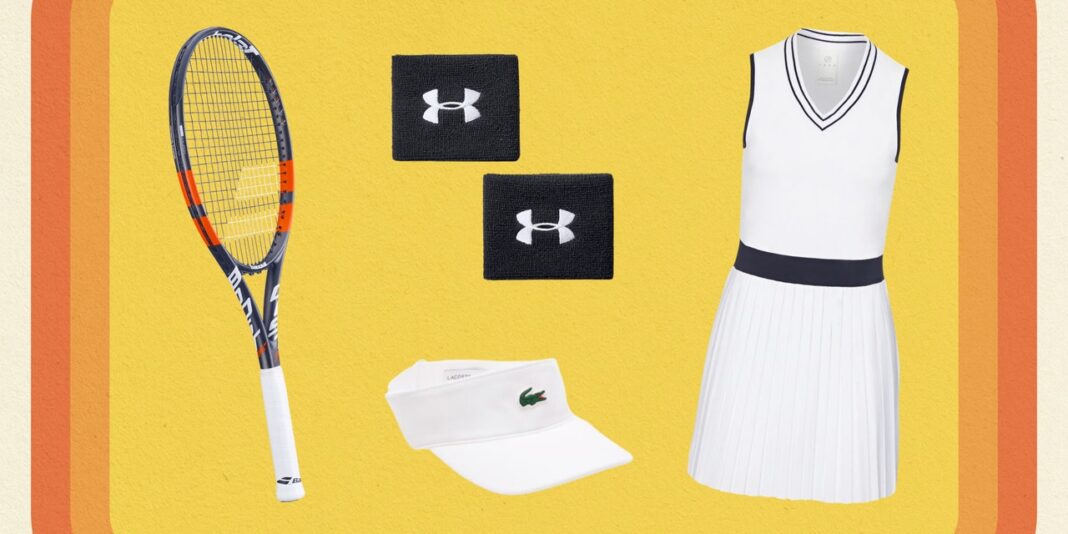Has watching the Paris Olympics and the US Open gotten you hyped about tennis and itching to pick up a racquet? The cute outfits, the workout you get during the match…what’s not to, um, ? But getting out on the court can be intimidating if you’re new to the sport. We chatted up tennis coaches to find the best tennis gear for beginners so that you can confidently focus on your backhand, not your gear.
What you need to get started
Great news: You can jump in with minimal equipment while you figure out what’s most comfortable for you, especially if you have a coach providing things like a racquet or tennis balls for your first few sessions. The coaches we spoke with recommend starting with a few key items in your bag: tennis shoes, a water bottle, a towel, comfy clothes, and something to keep the sun out of your eyes. Ahead, find a bunch of expert-approved options to get you ready for that first rally.
In this article
The main thing you want to consider when you shop for a racquet is its weight. Phyllis Wilundathe adult tennis director at Midtown Athletic Club and a member of the Wilson Select Team, says she typically recommends a lighter racquet that weighs 8.9 to 10.1 ounces, like the Wilson Blade. But your coach might recommend something heavier if you have a strong arm—a heftier racquet will give you more control, so you’re not blasting the ball across the net and out of bounds.
More great tennis racquets
Babolat’s Boost line is also beginner-friendly: Anthony Evrardthe cofounder and CEO of tennis club Court 16 in New York City, says they’re not too expensive, they’re lightweight, and they’re easy to handle. He also recommends Babolat’s Evo line for players still honing their technique who prefer a gentler bounce—the Strike Gen2 comes in at 10.2 ounces. Willunda likes Head’s Radical linewhich includes racquets that weigh up to 11.1 ounces.
Best Tennis Balls: Wilson US Open Tournament Red Pack
Tennis balls come in four colors: red, orange, green, and that classic neon yellow—all of which are approved by the International Tennis Federation. Willunda recommends starting out with red balls, which are larger, slower, and only bounce about waist-high because they have the lowest compression. (Orange, green, and yellow balls are the same size but are filled with more air, which means each one is faster and bouncier than the one before it.) “If we put you in with a green or a yellow ball [before you’re ready]you’re going to feel like a dog in the park and the ball’s just going to fly everywhere,” she says. This three-pack of red balls from Wilson is budget-friendly and forgiving—if one ball flies over the fence, you’ve still got two backups.
More great tennis balls
Once you’ve played with low-compression balls and are ready for yellow ones, Eric Davidsona tennis supervisor at Midtown Athletic Club and a member of the Wilson Select Team, recommends Wilson’s US Open Tennis Balls. “They last the longest and the material on the outside doesn’t rub off and fade as quickly as other brands do,” he says. “I can teach consistently for six months, three times a day, and my Wilson balls will still be okay.”
David Gutstadtcofounder of the sports club Ballers in Philadelphia, recommends Penn tennis ballswhich follow the same color system. Pro tip: “Don’t worry about the extra vs. regular duty felt—you won’t notice any difference between the two,” he says.
Supportive shoes are an absolute must when you start any new sport. Davidson likes the Adidas Barricade 13 shoes, which sit low on the ankle to allow you to move side to side easily.
More great tennis shoes
Many big athletic brands (including Asics and Nike) also make high-quality tennis shoes. No matter which brand you go with, look for a pair that hits a little below your ankles to give you flexibility. “When it comes to the sole of the tennis shoe, you want to make sure that it has support in the arch,” Davidson says. “A lot of flat tennis shoes will hurt, and they’ll start to wear and tear very quickly.”
If you’ll be practicing in warm weather, you might also look for breathable mesh uppers to help air flow. All of the recommendations below come straight from the experts we spoke with.
Clearly, tennis is a stylish sport. But our experts agree that functionality should rule over fashion—because if you’re uncomfortable, you’re probably going to be distracted. For you, comfort might mean wearing compressive leggings and a T-shirt, and for someone else, it could mean stepping out in a dress. The best thing about there not being a solid uniform is that you probably have the appropriate clothes in your closet already.




